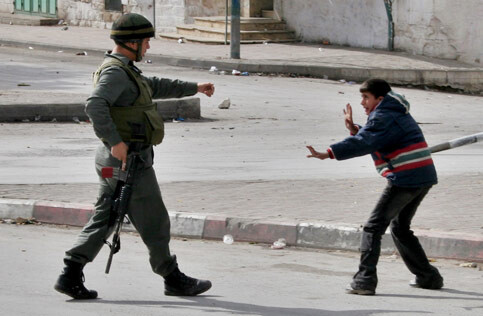The Electronic Intifada 10 September 2008

An Israeli soldier goes to arrest a Palestinian youth during clashes in West Bank city of Nablus, January 2008. (Rami Swidan/MaanImages)
As the bus of 199 prisoners (a number oddly short of 200) pulled into Ramallah recently, many will have seen the images of crying mothers and waving Palestinian flags as yet another indication of Israel’s willingness to take risks for peace. Newspapers were filled with op-eds praising Israel for its bravery and courage while the usual international voices hailed it as a step in the right direction.
Much less coverage was given to the 1,751 Palestinians who have been arrested since the last busload of prisoners was released last November. Many of these prisoners were taken from their homes in the night and held without trial for months on end. For those lucky enough to face trial, they are subject to trial by a military court, which does not meet international standards, and are often convicted on secret evidence. It is fairly obvious, given the increase in the number of prisoners and the unjust conditions in which they are held, that Israel’s latest prisoner release has little to do with a change in policy.
Instead, Israel’s release of prisoners should be seen for what it is, yet another successful public relations coup in a long line of actions aimed at convincing the world that it is desperately seeking peace. Time and again Israel has acquiesced a bare minimum, flaunting it as ostentatiously as possible, to make the world believe that it is striving to meet its international commitments.
In 1998, then Foreign Minister Ariel Sharon, instructed his followers to “run and grab as many hilltops as they can, to enlarge settlements” emphasizing that “everything we take now will stay ours…everything we don’t grab will go to them [the Palestinians]” (Samantha Shapiro, “The Unsettlers,” The New York Times, 16 February 2003).
Eight years later as Prime Minister, Sharon made what was advertised as a tiger uniquely loosing its stripes when he decided to make the “grand gesture” of withdrawing 9,000 settlers from Gaza and returning the land which they occupied, which amounted to a whopping one percent of the total occupied Palestinian land.
In March of this year the Israeli government stated that it was to dismantle 50 of the 580 roadblocks that dot the West Bank in order to give Palestinians breathing space to work on the state-building which is to eventually lead to Palestinian independence. This clearly Herculean effort on the part of Israel was broadcast far and wide to generate maximum sympathy.
A few weeks later, the UN reported that the well-publicized removal of roadblocks wasn’t as noble as first presented. Only 44 of the 61 roadblocks that Israel claims to have removed had actually been removed and of these, only five were considered to be “significant” with a further 26 reported to be of “no” or “minimal” significance. The remaining 14 roadblocks, the UN reported, were “questionable” and in some cases were put up temporarily simply to be subsequently pulled down in order to add to the numbers of “removed roadblocks” (Akiva Eldar, “UN: Israel’s removal of W. Bank roadblocks falls short of promise,” Haaretz, 12 April 2008).
For added effect Israel ensures that each of these concessions is accompanied by a vocal and overtly dramatic “public dialogue,” in which a certain section of society (in the case of Gaza, the settlers; in the case of the roadblocks, the generals) create a loud enough opposition to send a clear message to the world; internal dissent makes it is hard for us to move in the right direction. Emphasizing the costs of their actions is intended to show the international community that they are in a delicate situation, causing foreign governments to be wary of taking measures that may disrupt the supposed slow and steady progress. In this way the drastic measures necessary to end the occupation can indefinitely be put to one side.
Israel’s tactic of taking one well-publicized stride forward and two sneaky steps backwards has been remarkably effective in confusing people as to its real intentions. One need only to contrast the coverage of the 199 released prisoners, the land returned in Gaza and 50 “removed” roadblocks with the off-the-radar actions which brick by brick, prisoner by prisoner reverse the reality on the ground.
Israel has found a quiet partner in these actions from the international media, which is more interested in reporting a sensationalist story or one with a human interest angle rather than providing balanced in-depth reporting. Based on this approach, it becomes easy to see why the casual observer is uninformed, ill-informed, misinformed. It is not unreasonable to ask that when reporting on developments in the region, Israel’s actions be compared with its norms of behavior and placed within the wider context of the occupation. Giving a greater background will more effectively portray the reality of the conflict, a reality which will prompt people to see Israel’s propaganda for the shameless political opportunism that it is.
Akram Salhab is a Palestinian from Jerusalem who is currently studying an undergraduate degree in Politics at the University of Leeds. He is the student coordinator for the UK-based Palestine Solidarity Campaign as well as being active with the grassroots student organization Action Palestine.

